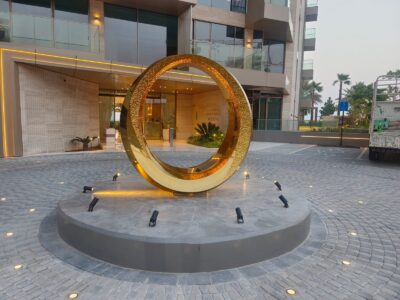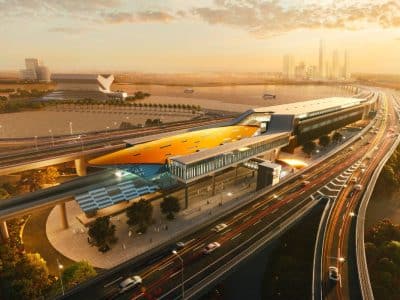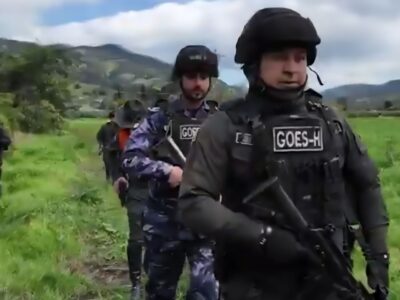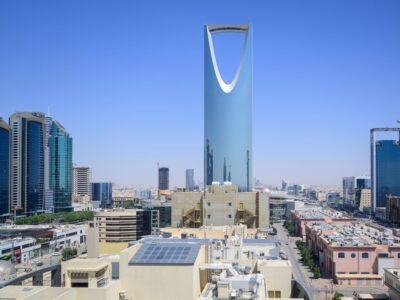A grainy close-up slowly comes into focus against a soundtrack of rock music to reveal a photograph from the early days of Iran’s 1979 revolution of youth on motorbikes about to ride over an American flag.
The opening sequence of “The Hunter” by Rafi Pitts sets the scene for a film where a disillusioned resident of Tehran takes revenge for the death of his wife and child — caught up in street disturbances during the 2009 elections — by shooting two policemen in cold blood as they drive down a highway.
Though the film shown at Dubai film festival avoids direct political messages, somehow the predicament of the Islamic republic three decades after it came into existence haunts the entire story — a thriller where the protagonist Ali is hunted down and ultimately killed by the representatives of the state.
“A cop-killer, eh? You think this country has no law and order?” a police officer says to him menacingly after his capture in the woods north of a capital city that the camera depicts as crowded, oppressive and alienating.
Only a few words here and there, or a brief radio news bulletin in the background, give any sense that the film was shot during the presidential elections that unleashed mass urban protests against returned president Mahmoud Ahmadinejad.
The preponderance of the color green in some scenes – even a wall-painting of waves in a hotel bedroom – hints at the Iranian opposition which often referred to itself as the “green wave” and took green as its rallying color.
The Berlin-based Pitts – whose “Sanam” won the Paris film festival best film prize in 2001 – says he never intended to make a movie about the controversial 2009 vote, which prompted street violence two days after the film crew left Iran.
But he did want to touch on the deep rifts dividing a society that witnessed not just revolution, but an eight-year-long war and advent of a new form of religious state viewed by its critics as another tyranny.
“Iran is a country where 70 percent of the population are under 30. That means 70 percent of the population don’t know what the revolution was,” he said at a post-screening forum.
“Then you have the population that’s governing who were fighting the war. They have to deal with their own emotions about what happened to them and their paranoia about the generation that doesn’t understand them,” Pitts added.
“You have a clash of two populations that don’t want to understand each other.”
Ali, the protagonist played by Pitts himself, barely speaks throughout the film and his anger at a society where he lives but in which he does not participate in any meaningful way is always muted. His escape is regular hunting trips north of Tehran.
The film’s observations on dehumanizing connections between the individual and urban space, on one hand, and the individual and the state, on the other, produce a striking denouement.
Driven over the edge by the death of his family and the cold manner in which officialdom handles the issue with him, Ali perches himself on a spot above a major highway where he has clear vision to snipe at motorists passing by.
He kills one man in a police car. The car grinds to a halt and a second officer steps out, allowing him a shot. The sounds of the city blank out to zero as the policeman falls to the ground, highlighting the banality of the act of the murder.
“I didn’t want the audience to feel gratification from seeing a man die, so I had to take the sound out. When he hits the ground and there’s silence, you might feel more uncomfortable than if I’d kept the traffic sound,” Pitts said.
“The highway death is like the death of Kennedy: it’s a fascinating image cinema-wise … over and over again you can watch the killing of Kennedy,” he said, referring to infamous footage of U.S. President John F. Kennedy’s 1963 assassination.
Pitts said the second section of the film, where Ali is pursued into the mountains, is based on a short story by Bozorg Alavi, a leftist dissident in the era of the Shah whose hopes for the Islamic revolution were short-lived.
“When I wrote the script I wasn’t thinking of anything else outside of what is happening to mankind — the economy, the way people live, the fact that people in modern society have very little time for anything,” Pitts said.
UK-trained Pitts hopes the film is oblique enough to allow him to continue film-making in Iran and one day get a showing in the country, although he said film restrictions had become stricter during Ahmadinejad’s second term.
“I think it will be shown one day, the question is how old I will be,” Pitts said.








